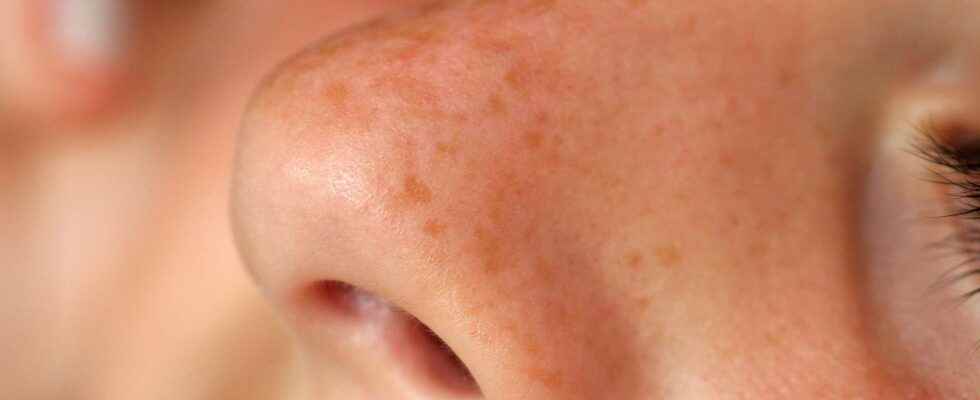Nasal polyposis is an invisible disease, and when it shows up it is first with mild symptoms, such as constant obstruction of the nose or heavy mucus secretion. Between the first consultation with the general practitioner and the identification of polyps in the nasal cavities in ENT, it can take several years. A long period during which the daily life of sick people can deteriorate.
You will also be interested
[EN VIDÉO] Coronavirus: loss of smell would ultimately be a reassuring symptom One of the most common symptoms of Covid-19 is loss of smell. But it’s more of a sign of a mild form of the disease, a new study shows.
The polyposis nasal is not just the presence of polyps in the nose, the disease affects all spheres of life. One million French people are affected by nasal polyposis, some at an advanced stage. All the stories are different, some patients wait several years before the diagnostic be asked by a specialist. While the appropriate treatment can provide relief to a majority of patients, for others, management can be complex, even if advances in matter knowledge and management of this disease are important.
The testimony of Pascaline suffering from nasosinus polyposis, a disease commonly called nasal polyposis. © Sanofi France
Nasal polyposis: can it be cured?
Every day, patients wash their noses with serum physiological or saline solution and apply corticosteroids in spray to reduceinflammation locally at the level of the polyps. When this is no longer sufficient, oral cures are considered to improve symptoms, in small amounts and for a short time.
The management of one of the most disabling symptoms, anosmia which deprives patients of everyday smells and flavors, is delicate. Although surgery relieves symptoms of nasal obstruction, it provides less clinical benefit on the recovery of the sense of smell. This clinical benefit may decrease over the course of surgical revisions. In the event of this failure, the arrival of new therapeutic options brings hope to patients without a solution.
After surgery, recurrence of polyps is common. According to a consensus study of The European Forum for Research and Education in Allergy and Airway Diseases, which brings together, among others, experts in nasal polyposis, in almost half of cases the polyps are again visible by endoscopy 18 months after the operation, and 10 to 20% of patients must be operated on for a second time within three to five years of the first operation.
Despite these treatment options, the relief of symptoms and control of the disease in its severe forms remains partial and transient.
Fear of surgery
A majority of PNS patients are apprehensive about having to resort to surgery. From February 5 to 10, 2021, Ifop carried out a self-administered online questionnaire survey for Sanofi Genzyme, among a sample of 3,013 people, aged 18 and over, residing in metropolitan France. Within this sample, Ifop isolated 327 people affected or having already been affected by nasosinus polyposis. The survey shows that 67% of people currently affected by nasal polyposis fear having to have surgery, this proportion reaches 88% in patients who have already had surgery.
Anosmia, a serious handicap although invisible
According to this same survey conducted by Sanofi Genzyme and Ifop on anosmia in France, one in six French people claims to have already experienced a loss ofsmell and taste. The Covid-19 epidemic has put this invisible handicap in the spotlight, but far from being marginal otherwise: 64% of respondents say they have lost their sense of smell following another pathology that the Covid-19. For 8% of them, it is a consequence of nasal polyposis.
Losing the sense of taste and smell has a heavy impact on the mental health of anosmics. Still according to the survey conducted by Sanofi Genzyme and Ifop, 62% of anosmics see their general mood deteriorate, as well as their morale and psychological well-being. Depression is particularly prevalent in people who have lost their sense of smell for a long time. Just like suicidal thoughts, whichimpact is twice as high as in the general population.
Find support
Many patients find support and an attentive ear with the association Anosmie.org. Nasal polyposis ambassadors for the association share their daily lives and provide advice to people in the same situation as them.
Article produced in partnership with Sanofi Genzyme.
Sources:
- Fokkens WJ, Lund V, Bachert C, et al. EUFOREA consensus on biologics for CRSwNP with or without asthma. Allergy. 2019; 74 (12): 2312-2319. doi: 10.1111 / all.13875
- Ifop study for Sanofi Genzyme carried out by self-administered online questionnaire from February 5 to 10, 2021, with a sample of 3,013 people, of the French population aged 18 and over living in metropolitan France.
Reference 7000035241 – 10/2021
Interested in what you just read?
.
fs6
